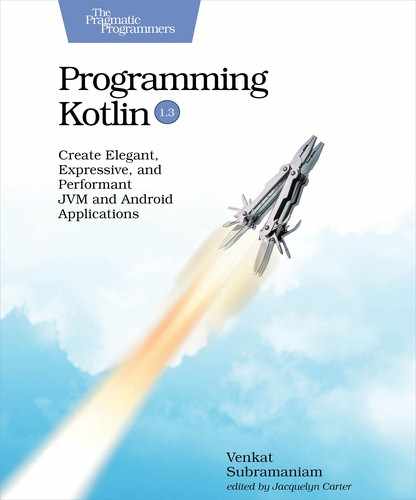Using Map
A map keeps a collection of key-value pairs. Much like the way Kotlin provides a read-only immutable interface and a read-write mutable interface for the JDK List, the language also provides two interfaces for the JDK Map. All methods of the JDK Map interface are available through the mutable interface, and the read-only methods are available through the immutable interface.
You may use mapOf() to create a map and get a reference to the read-only interface Map<K, V>. Alternatively, use mutableMapOf() to get access to MutableMap<K, V>. Also, you may obtain a reference to the JDK HashMap using hashMapOf(), LinkedHashMap using linkedMapOf(), and SortedMap using sortedMapOf().
Let’s create an example using the immutable/read-only interface Map<K, V> and look at ways to access the elements. Here’s a piece of code to create a map of site names and their corresponding URLs, where both keys and values are Strings:
| | val sites = mapOf("pragprog" to "https://www.pragprog.com", |
| | "agiledeveloper" to "https://agiledeveloper.com") |
| | |
| | println(sites.size) //2 |
The key-value pairs are created using the to() extension function, available on any object in Kotlin, and mapOf(), which takes a vararg of Pair<K, V>. The size property will tell you the number of entries in the map.
You may iterate over all the keys in the map using the keys property or all the values using the values property. You may also check if a particular key or value exists using the containsKey() and containsValue() methods, respectively. Alternatively, you may use the contains() method or the in operator to check for a key’s presence:
| | println(sites.containsKey("agiledeveloper")) //true |
| | println(sites.containsValue("http://www.example.com")) //false |
| | println(sites.contains("agiledeveloper")) //true |
| | println("agiledeveloper" in sites) //true |
To access the value for a key you may use the get() method, but there’s a catch. The following won’t work:
| | val pragProgSite: String = sites.get("pragprog") //ERROR |
It’s not guaranteed that a key exists in the map, so there may not be a value for it. The get() method returns a nullable type—see Nullable References. Kotlin protects us at compile time and wants us to use a nullable reference type:
| | val pragProgSite: String? = sites.get("pragprog") |
The get() method is also used for the index operator [], so instead of using get() we may use that operator:
| | val pragProgSite2: String? = sites["pragprog"] |
That’s convenient, but we can avoid the nullable reference type by providing an alternative, default, value if the key doesn’t exist:
| | val agiledeveloper = |
| | sites.getOrDefault("agiledeveloper", "http://www.example.com") |
If the key "agiledeveloper" doesn’t exist in the map, then the value provided as the second argument will be returned. Otherwise, the actual value will be returned.
The mapOf() function provides a read-only reference, so we can’t mutate the map. But we may create a new map with additional key-value pairs, like so:
| | val sitesWithExample = sites + ("example" to "http://www.example.com") |
Similarly, we can use the - operator to create a new map without a particular key that may be present in the original map, like this:
| | val withoutAgileDeveloper = sites - "agiledeveloper" |
To iterate over the entries in the map, you may use the for loop we saw in Chapter 4, External Iteration and Argument Matching. Let’s use the for loop here:
| | for (entry in sites) { |
| | println("${entry.key} --- ${entry.value}") |
| | } |
The variable entry refers to a Map entry, and we can get the key and value from that object. But instead of that extra step, we may use the destructuring feature we saw in Destructuring, to extract the key and value, like so:
| | for ((key, value) in sites) { |
| | println("$key --- $value") |
| | } |
As the iteration progresses, Kotlin automatically extracts the key and the value from each entry into the immutable variables named key and value, thanks to the feature of destructuring.
We used the imperative style to loop here. Later in the book, when we explore internal iterators, we’ll revisit this to see how to iterate over the values using the functional style—in Chapter 10, Functional Programming with Lambdas.
The Map interface also has two special methods, getValue() and setValue(), which enable us to use maps as delegates—a powerful concept we’ll dive into in Chapter 9, Extension Through Delegation.
